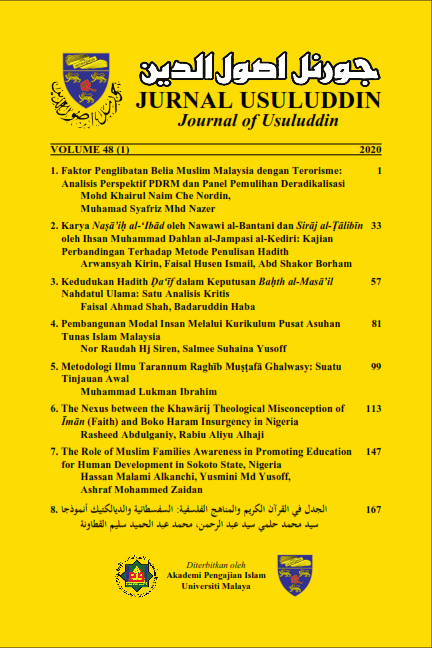The Nexus between the KhawÄrij Theological Misconception of ĪmÄn (Faith) and Boko Haram Insurgency in Nigeria
DOI:
https://doi.org/10.22452/usuluddin.vol48no1.6Abstract
In Islam, Īmān (faith) is the bedrock and central-point-determinant of the yardstick to evaluate the extent to which a person has complied with teachings and precepts of Islam. The relationship between Īmān and ‘amal has been scholastically debated since the demise of the Prophet by the divergent Muslim theological groups (firāq). Since the first Islamic century, the debate has led to divisions among the Muslim Ummah giving birth to deviating sects such as the Khawārij, Mu‘tazilah, Murji’ah and the Shī‘ah with conflicting theological and ideological standpoints. Observably, the sects still exist across the Muslim world either in name or form at times with violent tendencies, causing havoc and challenging the inherent peaceful nature of Islam. This paper examined the theological viewpoint of the Khawārij and its impact on the Boko Haram insurgent group hatched in Nigeria but later spread to other neighbouring countries. Historical and comparative research methods have been adopted while using content analysis approach on the data collated. The paper discovered that, comparatively, the insurrectionary Boko Haram sect is one of the neo-khariji affiliates of the 21st century due to their gross abuse of the concept of Jihad and misapplication of takfīr loosely on any Muslim other than them. This ideology is what they use to justified their actions against all others besides them. A group that causes havoc in Nigeria from security to socio-economic and religious instabilities as did the Khawārij to the early Muslim community. Therefore, it recommends that the dreaded sect should be combated not only with military force, but also with deliberate and well-articulated intellectual cum ideological counter-narratives to disabuse and de-radicalize the mind-set of its existing as well as prospective members.











